I drove across Saudi Arabia as a solo woman – and what I discovered may surprise you
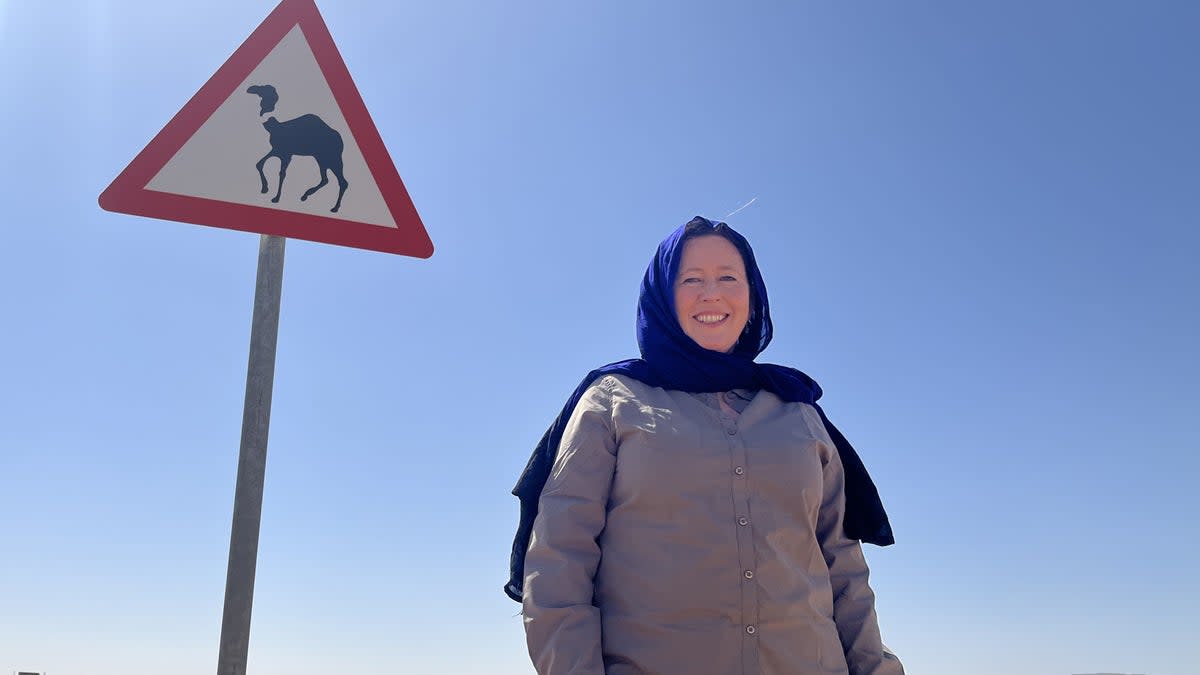
Why?” asked my puzzled friend when I told him I was planning to drive solo around Saudi Arabia. “Because I can – at last,” is the short answer. My fascination with Arabia began when my Dad gave me the book Arabian Sands about Wilfred Thesiger’s heroic crossing of the Empty Quarter.
I went on to study Arabic and travel all over the region, but Saudi always felt closed. Now, you can get a tourist visa online in a matter of minutes and women won the right to drive in 2018. It was time.
Anas at the budget rent-a-car raised an eyebrow when I showed him my route. “‘You’ll be needing the unlimited mileage for this one.’” I shared that I was very nervous about Saudi driving – which had terrified me on my Uber rides.
He took it well considering I was about to use one of his cars. “Ha! Day one you’ll be creeping slowly.” He mimicked a slow Mr Magoo at the wheel. “After these kilometres…” He flicked his thumbnail beneath his teeth, stuck an imaginary arm out of his imaginary car and turned up the music. “You’ll drive like one of us.”
I left Riyadh at 6.30am on a Friday for what would end up being a 3,215km (1,998 miles) round trip. My first big aim was Jeddah with its historic old town and cosmopolitan community. It was the middle of May and outside it was 40C but Saudi does air conditioning brilliantly and I stayed cool. I needed the comfort because I had some long driving days.
My first hazard was sand planning. I hit a drift across the road and the steering wheel swung from side to side. Then came the camel crossings. Out of nowhere, a big bull camel hobbled into my path. A huge truck was powering down behind me so I whacked on the hazards and came to a stop, praying he would too.
I pulled into a rest area to fill up the tank and calm down. I believe that, like visiting a supermarket, motorway stops give you an instant insight into any country. Half a tank of petrol for just £12 and the women’s toilets situated in the ladies’ mosque in the ablutions area. I was glad I was wearing an abaya and a headscarf.
There is no legal requirement to wear either now, a huge change in Saudi. You must dress modestly, though, with sleeves to the elbow and skirts or trousers below the knee. I live in Morocco, so I am well used to a modest dress code and felt very comfortable in my abaya and headscarf.
Of course, I still got looked at, but more by the women and girls. My headscarves were pink and orange so not the usual black and I like to think the looks were admiring, rather than “What is she wearing?”
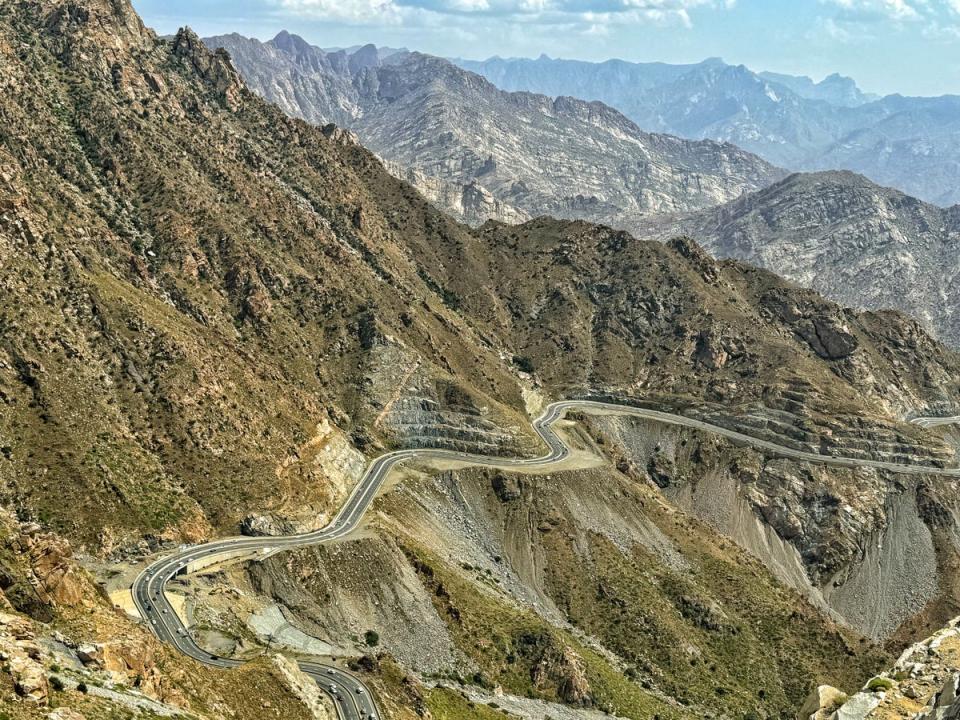
Hungry, I opted for a falafel sandwich with spicy sauce and fresh orange juice (£1.50). The friendly cook was a Yemeni and showed me pictures of his children and farm from back home. He told me that he goes home about once a year for a month. Last stop was the minimarket, a bazaar full of all earthly delights from camel halters to caramel magnums.
After 10 hours on the road, I arrived in Taif in a thunderstorm complete with dramatic lightning displays. Taif is a charming mountainous resort where Saudi families come to keep cool in the summer. It is famous for its rose gardens and its baboons.
There are funfairs and playgrounds everywhere and little kiosks selling juices and snacks. I’d booked the Intercontinental as I wanted some comfort and security on that first night. I was also slightly apprehensive as to how people would react to a woman travelling on her own. Warmly and chattily, it turned out. The restaurant manager was a Saudi woman and proud of her enormous breakfast buffet – topped off by a wall of doughnuts.
Out of Taif, a new driving hazard loomed. Non-Muslims are not allowed to enter the city of Mecca, the holiest city in Islam and the site of the Hajj (pilgrimage), which all Muslims are obligated to perform once in their lifetimes if they are able.
With more than two billion Muslims worldwide, there is a lottery system in place. Google Maps directed me straight ahead but a huge sign right said: “For non-Muslims going to…” and then three names of towns I didn’t recognise. Flustered, I stuck with Google. There was nowhere to pull over, so I drove and hoped I wasn’t breaking any rules. Deliberately trying to enter Mecca as a non-Muslim can result in a fine and deportation.
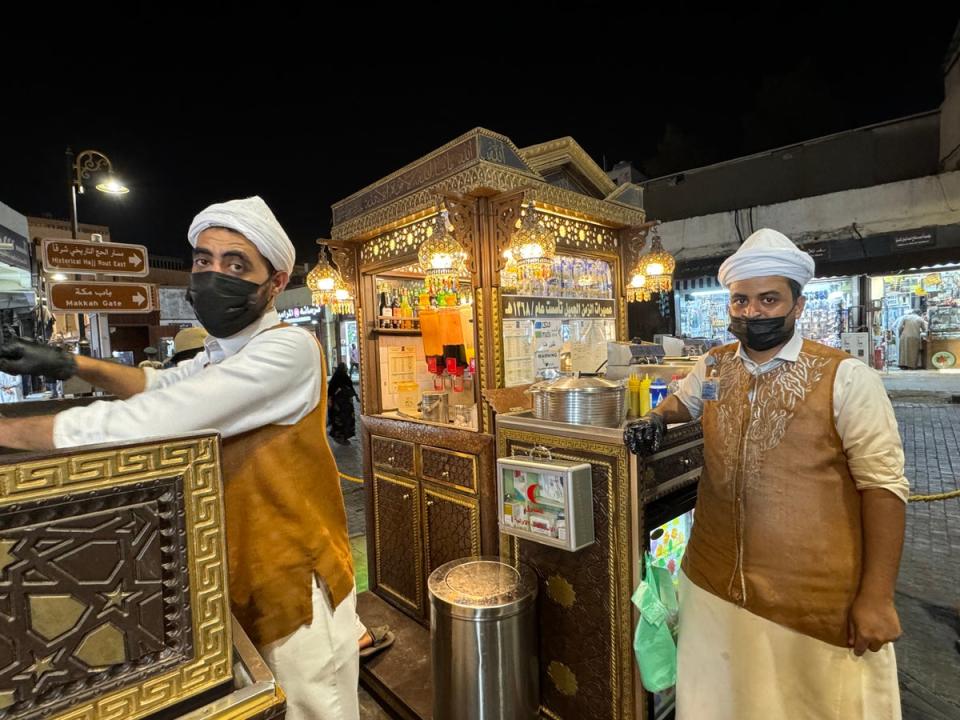
Once in Jeddah, after a short day of three hours on the road, I ended up completely off the path in a dirt track area where men in white thobes and red and white headscarves sat on top of their trucks watching the sun go down and veiled women sold tissues and trinkets from mats on the ground.
The airy reception and friendly welcome from the female receptionist in the Shada Hotel were a relief. The hotel is designed and run by Saudi sisters. All through my journey, I met women working alongside men, from the immigration desk at the airport to the highest levels in universities. The decor throughout has modern twists on traditional Arab themes like the striking, oversized wicker light fittings. It felt like an oasis of calm.
Sara Omar is Jeddah born and bred and has her own travel agency. A licenced guide, she was the perfect choice for a tour of Al Balad, the historic old town. She arrived to meet me in a glamorous cloud of black curly hair and an envy-inducing silk abaya which referenced the chequered headscarves worn by men.
We started at the gates of the old medina. “When we were children, we used to come here on the morning of Eid. We would ride in the big wooden wheel which was turned by one man. Then, we would do the same as trick and treating, collecting sweets and money from friends and family,” she told me.
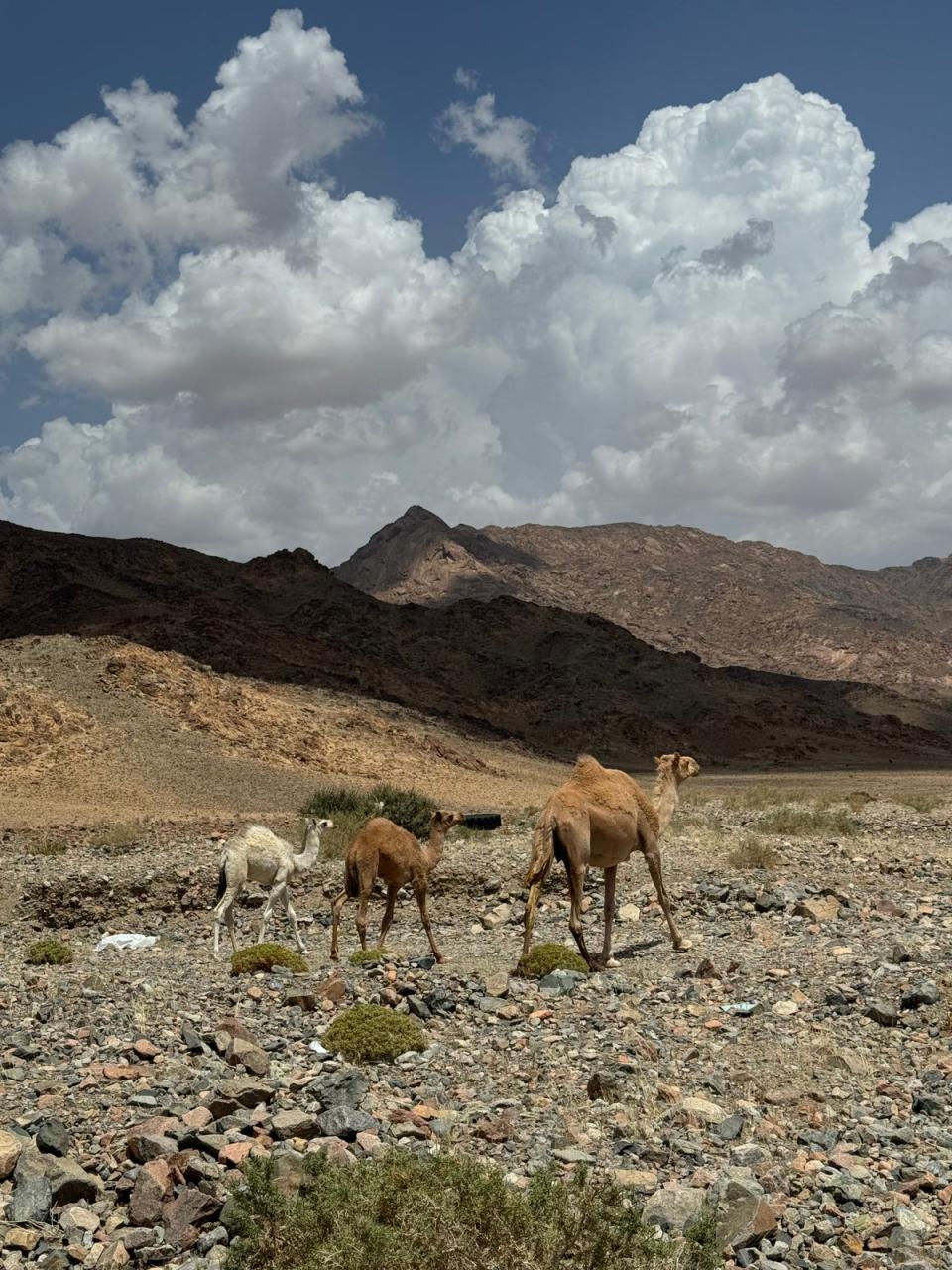
The old city is being carefully restored and retains its charm. Tall buildings decorated with wooden fretwork windows and balconies – roshan – crowd over the narrow streets, jostling with palm trees.
Sara showed me a Rabat. “This is a house paid for by the government where widows and divorces can live for free. There are still a few of them in Jeddah.”
As the sun went down, the streets filled up as the evening air was cooler. Families came out for shopping and snacking on chickpeas with pickled beetroot and “street chips” which are deliciously greasy and covered in a garlicky, chilli sauce. It was all women and children and I asked if this was a segregated area. “No,” laughed Sara. “It’s just in our culture the men let the women sit – they are all over there standing up with their food.”
I left the easy-going vibe of Jeddah and headed north. My reward was the best scenery of the trip. Golden flat plains, peppered with acacia trees and enclosed in high, red mountains. My night stop was Wadi Disah – a gem, and part of the Mohammed Bin Salman Royal Reserve, an oasis filled with pink oleanders nestled into the sandstone peaks. It rained a little and I walked in the wet sand between the date palms. Tiny frogs hopped out from under my feet. In a desert landscape, the smell of wet earth is particularly special.
This area has been settled for millennia – water means life, and I found the proof in a series of rock carvings depicting battle scenes from thousands of years ago, right by the road.
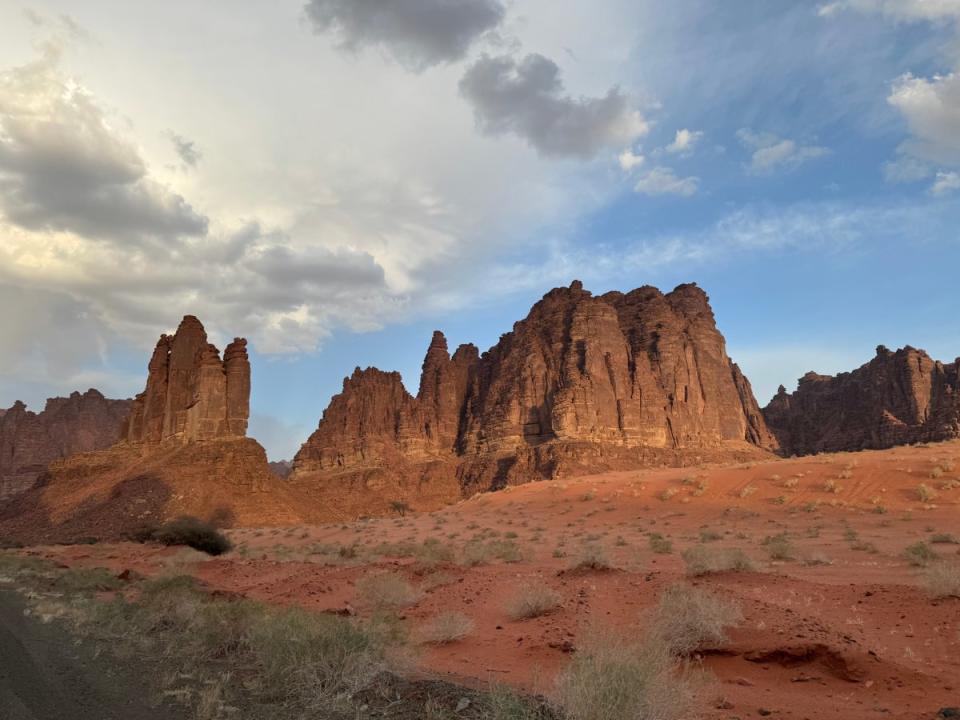
As I headed back to Riyadh, I saw on the news that a young woman had been imprisoned for 11 years for charges related to her clothing choices and expression of her views online. It was a sobering read.
Road trips give you time to think. Saudi surprised me. Everyone I met had been open and friendly. I’d driven through deserts, along the coasts, through mountains and oases, much more variety than I had imagined. In the culture too – from the street food of Jeddah to the rock carvings of Wadi Disah.
Mainly, though, I was surprised by just how easy it had been to drive around on my own and do my own exploring. I had found no barriers travelling as a solo woman and had not felt uncomfortable – except for twitchy legs after a 10-hour stretch. I felt a spirit of change and development in the country and the women I met like Sara and the female manager at the InterContinental Hotel were full of pride in their nation. Even after 3,215km, I feel like there’s a lot more to discover and learn
Alice stayed at the InterContinental Riyadh and InterContinental Taif, as well as Shada in Jeddah.
If you fancy the trip but are nervous about travelling alone, Intrepid Travel is running a women’s trip to Saudi Arabia, which takes in part of this route.
Alice Morrison’s new series, ‘Arabian Adventures: Secrets of the Nabateans’ is on BBC News on the first and second weekends of June and will be on BBC iPlayer after that


